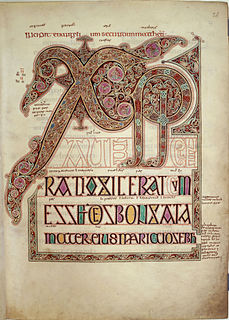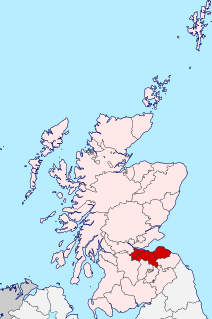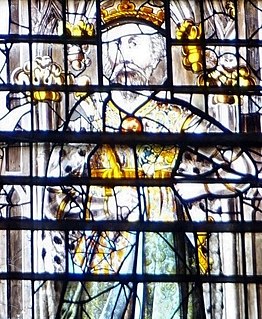March law or marcher law is a system of legal compromises formerly in use in the border regions of England. Specifically, it may refer to:
March law or marcher law is a system of legal compromises formerly in use in the border regions of England. Specifically, it may refer to:
Moot may refer to:

The Anglo-Saxons were a cultural group who inhabited England. They traced their origins to the 5th century settlement of incomers to Britain, who migrated to the island from the North Sea coastlands of mainland Europe. However, the ethnogenesis of the Anglo-Saxons occurred within Britain, and the identity was not merely directly imported. The development of an Anglo-Saxon identity arose from the interaction between incoming groups of people from a number of Germanic tribes, both amongst themselves, and with indigenous British groups. Many of the natives, over time, adopted Anglo-Saxon culture and language and were assimilated. The Anglo-Saxons established the Kingdom of England, and the modern English language owes almost half of its words – including the most common words of everyday speech – to their language.

The Scottish Borders is one of 32 council areas of Scotland. It borders the City of Edinburgh, Dumfries and Galloway, East Lothian, Midlothian, South Lanarkshire, West Lothian and, to the south-west, south and east, the English counties of Cumbria and Northumberland. The administrative centre of the area is Newtown St Boswells.

Lothian is a region of the Scottish Lowlands, lying between the southern shore of the Firth of Forth and the Lammermuir Hills and the Moorfoot Hills. The principal settlement is the Scottish capital, Edinburgh, while other significant towns include Livingston, Linlithgow, Bathgate, Queensferry, Dalkeith, Bonnyrigg, Penicuik, Musselburgh, Prestonpans, North Berwick, Dunbar, and Haddington.

Ine, also rendered Ini or Ina, was King of Wessex from 689 to 726. At Ine's accession, his kingdom dominated much of southern England. However, he was unable to retain the territorial gains of his predecessor, Cædwalla, who had expanded West Saxon territory substantially. By the end of Ine's reign, the kingdoms of Kent, Sussex, and Essex were no longer under West Saxon sway; however, Ine maintained control of what is now Hampshire, and consolidated and extended Wessex's territory in the western peninsula.
In medieval Europe, a march or mark was, in broad terms, any kind of borderland, as opposed to a national "heartland". More specifically, a march was a border between realms, and/or a neutral/buffer zone under joint control of two states, in which different laws might apply. In both of these senses, marches served a political purpose, such as providing warning of military incursions, or regulating cross-border trade, or both.

The Kingdom of England was a sovereign state on the island of Great Britain from 12 July 927, when it emerged from various Anglo-Saxon kingdoms, until 1 May 1707, when it united with Scotland to form the Kingdom of Great Britain. The Kingdom of England was among the most powerful states in Europe during the medieval period.
In law, a person is acting in a position if they are not serving in the position on a permanent basis. This may be the case if the position has not yet been formally created, the person is only occupying the position on an interim basis, the person does not have a mandate, or if the person meant to execute the role is incompetent or incapacitated.

United Ireland, also referred to as Irish reunification, is the proposition that all of the island of Ireland should be a single sovereign state. At present, the island is divided politically; the sovereign Republic of Ireland has jurisdiction over the majority of Ireland, while Northern Ireland, which lies entirely within Ulster, is part of the United Kingdom. Achieving a united Ireland is a central tenet of Irish nationalism, particularly of both mainstream and dissident Irish republican political and paramilitary organisations. Unionists support Northern Ireland remaining part of the United Kingdom, and therefore oppose Irish unification.
A Member of the Legislative Assembly (MLA) is a representative elected by the voters of an electoral district (constituency) to the legislature of State government in the Indian system of government. From each constituency, the people elect one representative who then becomes a member of the Legislative Assembly (MLA). Each state has between seven and nine MLAs for every Member of Parliament (MP) that it has in the Lok Sabha, the lower house of India's bicameral parliament. There are also members in three unicameral legislatures in Union Territories: the Delhi Legislative Assembly, Jammu and Kashmir Legislative Assembly Puducherry Legislative Assembly.
War in Afghanistan, Afghan war, or Afghan civil war may refer to:
The Anglo-Sikh wars were a series of 1840s conflicts between the British East India Trading Company along with the British Empire and the Sikhs.
A boundary commission is a legal entity that determines borders of nations, states, constituencies.
A donor in general is a person, organization or government which donates something voluntarily. The term is usually used to represent a form of pure altruism, but is sometimes used when the payment for a service is recognized by all parties as representing less than the value of the donation and that the motivation is altruistic. In business law a donor is someone who is giving the gift (law), and a donee the person receiving the gift.
The Anglo–Maratha War were three wars fought in the Indian sub-continent between the Maratha Empire and the British East India Company over territory. They were:
Scottish Marches was the term used for the Anglo-Scottish border during the late medieval and early modern eras, characterised by violence and cross-border raids. The Scottish Marches era came to an end during the first decade of the 17th century following the union of the crowns of England and Scotland.
Pravoberezhny District is the name of several administrative and municipal districts in Russia. The name literally means "located on the right bank".

The Anglo-Scottish border is a border separating Scotland and England which runs for 96 miles (154 km) between Marshall Meadows Bay on the east coast and the Solway Firth in the west. The surrounding area is known as the Borderlands.
Anglo-Afghan War may refer to:
Hyglac is an early Germanic personal name, known through northern Europe, Scandinavia and Anglo-Saxon England. It derives from Proto-Germanic *Hugilaikaz, from *hugjaną "courage" + -laikaz ("ritual").